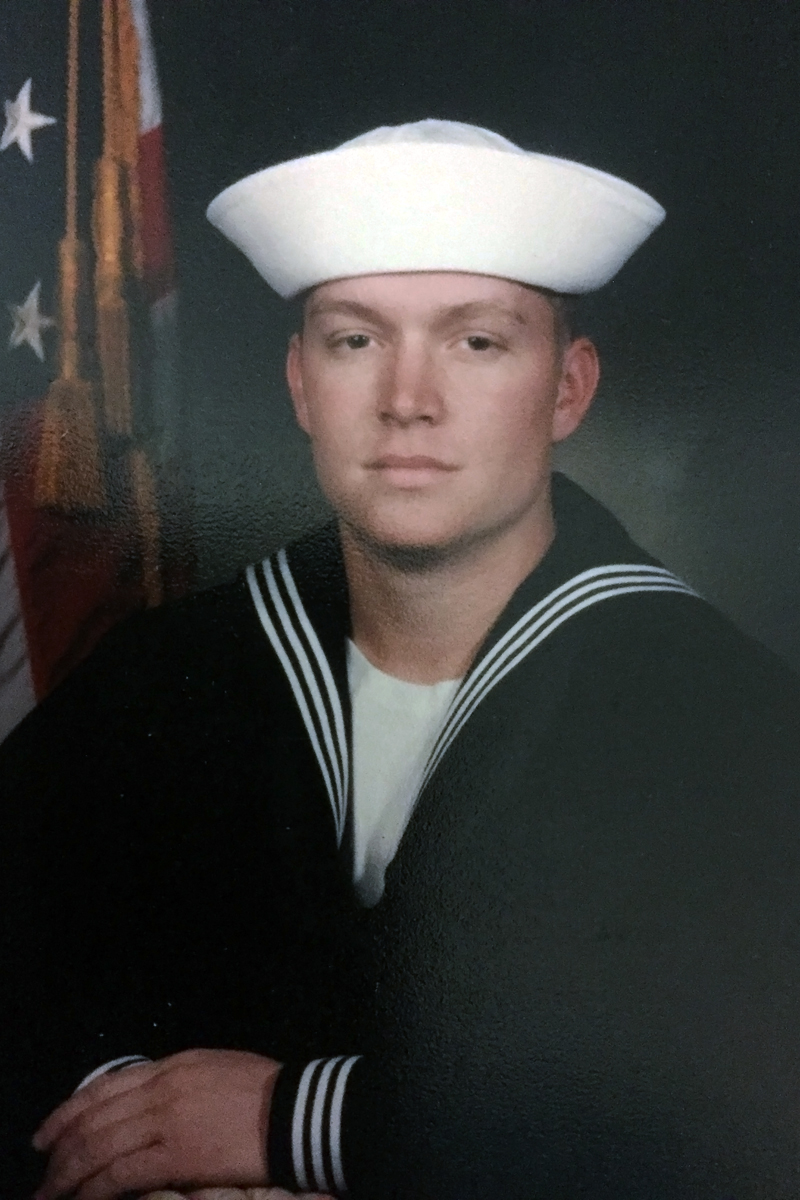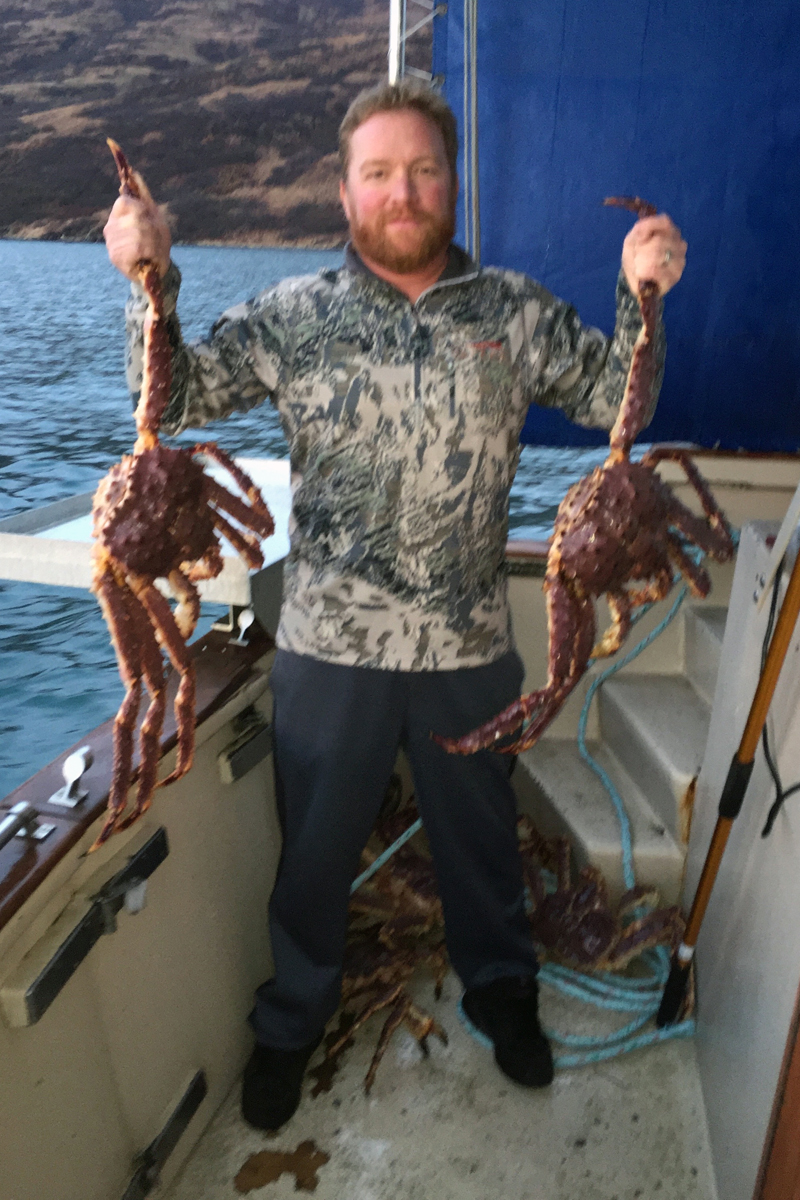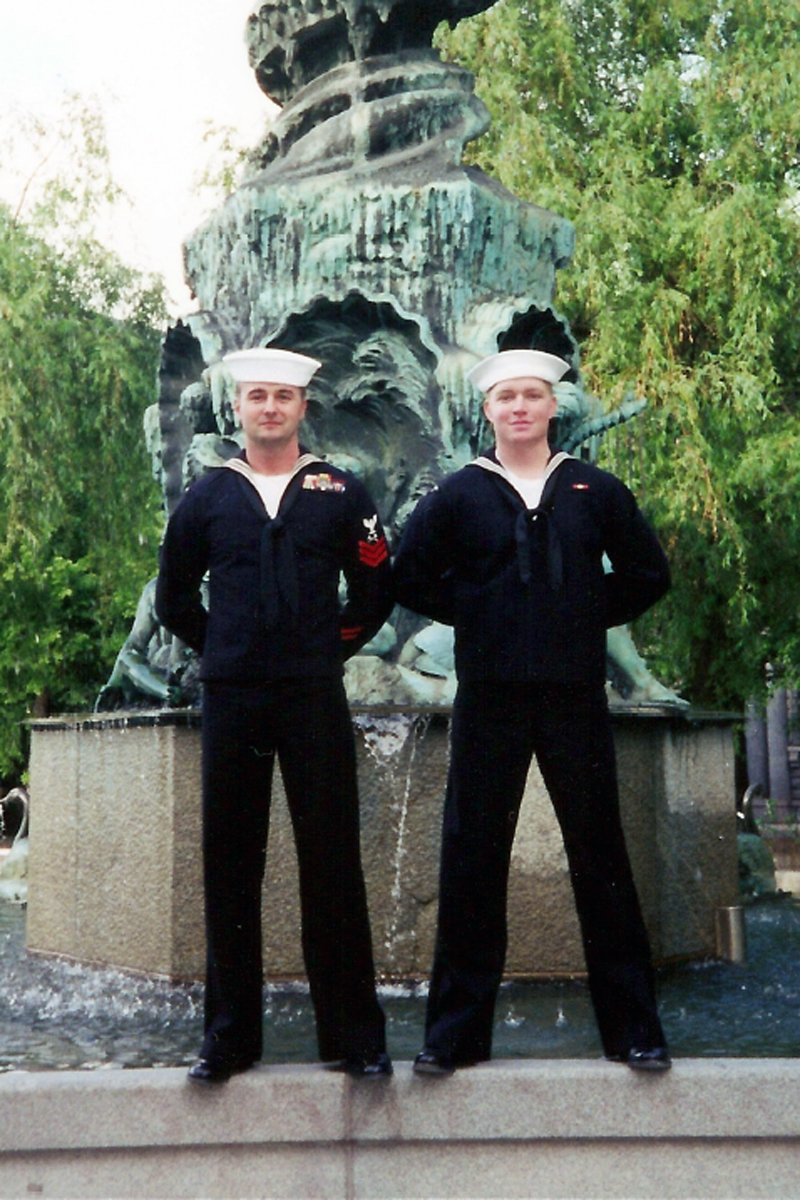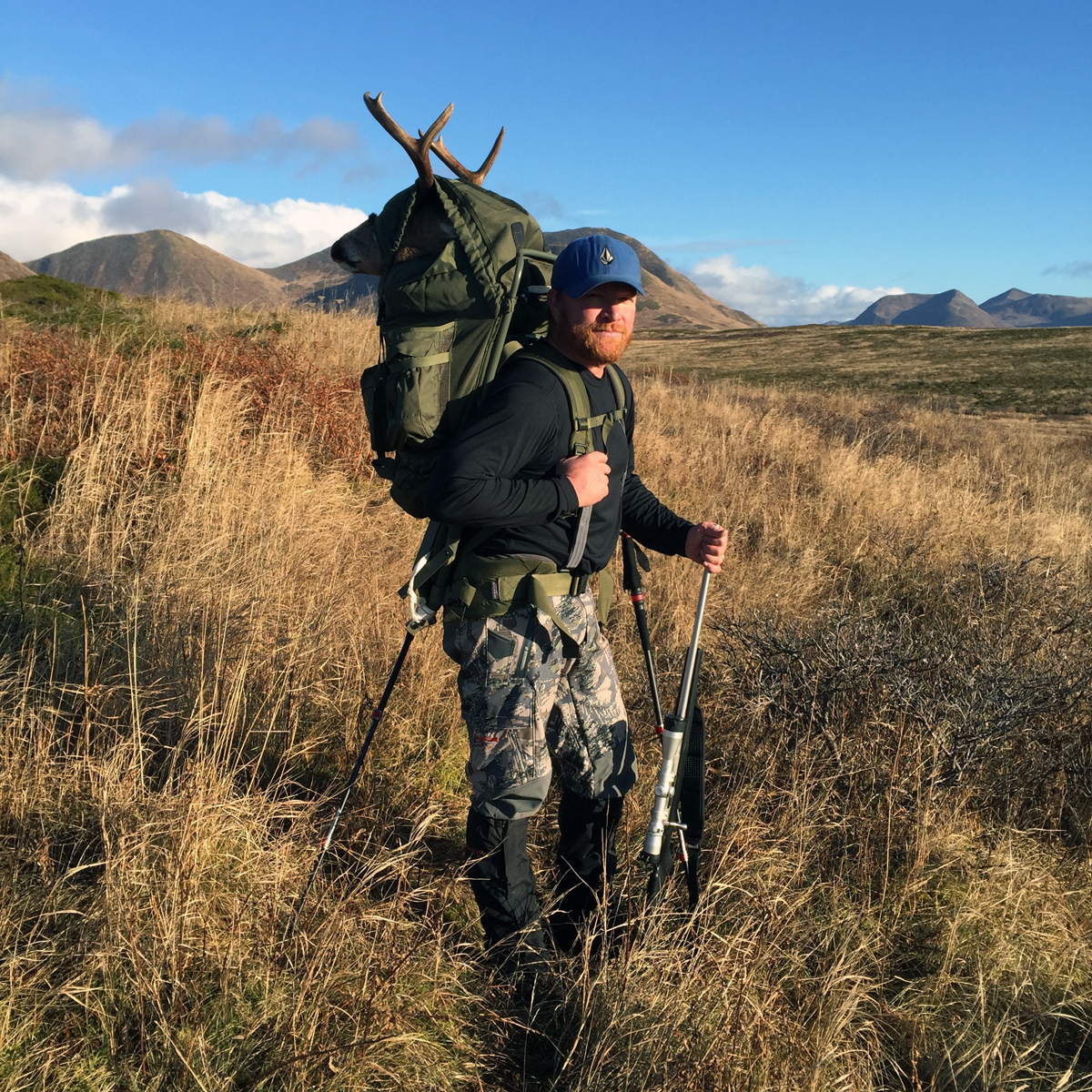As a 12-year-old in the small coastal community of Wrangell, Alaska, Andrew Merrick watched the cruise ships come into town, loaded with visitors who wanted to fish the Stikine River salmon runs. He’d been working for his best friend’s family—commercial crabbers—and was used to being on a crab boat. So it wasn’t much of a leap to pair up with his young friend and meet the visitors, taking them out fishing.
“My best friend’s dad was a harbor master and so he’d call us up, see if we’re at home. Then he’d have the mom come get us and drop us off at the boat launch,” Andrew tells us.
We ask how this played out with the guests. Somebody must have wondered what was going on.
“Yeah, we got a couple of looks like, who’s this? We’re going with these kids? But we knew all the fishing spots. It wasn’t hard. We knew exactly where to take them and make sure they got fish.”
This tale exemplifies the character of Andrew Merrick—confident, resourceful, and focused. Andrew was born in Pomona, CA, and his family moved to Southeastern Alaska when he was one year old. “My dad was a logger,” he says. “We lived in a little logging town on False Island.” His family moved throughout small towns in Southeastern Alaska including Kake and Wrangell.
It wasn’t long after this that Andrew’s family relocated back to Southern California, where he remained for most of the subsequent years.

One month before his 20th birthday Andrew enlisted in the US Navy. He attended boot camp in Great Lakes, Illinois before moving on for a year of more specialized training in Naval Damage Control in the San Francisco area. For Andrew, this meant shipboard firefighting. “We run towards the problem when everybody else is running away,” says Andrew.
Later he was stationed in Mayport, Florida, and then Andrew spent three years aboard the destroyer Spruance DD963.
His job in damage control meant more than putting out fires. When there was a hole in the side of the ship and subsequent flooding, Andrew and his team would contain the situation as much as possible to get the ship back to port for proper repair. “Our main control was fire, flooding, and damage,” says Andrew. “I maintained the firefighting equipment, and did the task maintenance repairs. We had a helicopter attached to the ship so our team held all the key positions on the flight deck fire party.”
Medical training was also part of Andrew’s responsibilities. “We were pretty much first responders,” he tells us. “We all had to be trained up in advanced first aid to contain the bleeding. If there was somebody hurt, we had to take care of them until the docs got there.”
Did he ever think about becoming a corpsman?
“Not at that time, no, I didn’t,” says Andrew. “I talked to corpsmen. Their job, especially on the ship, was unique. Corpsmen were treating people that they worked with constantly and would get rather intimate with them. I didn’t want any part of it at that time. I was focused on what I wanted to do when I got out—to become a civilian firefighter.”
After discharge there were four years of inactive Reserve Service, meaning that the Navy had the right to call Andrew back for whatever reason during that period.
Now back in California, Andrew focused on parlaying his military skills into civilian employment after service. He obtained his Fire Science Associates Degree, went through an EMT course, and started working on ambulances part time. His full time job was in construction, which gave him the flexibility to be on-call for firefighting and fill in for others.
“I volunteered for a local fire department and spent most of my time with them working on their ambulance, running calls,” Andrew says. “That’s where I really got the taste for medicine. I really liked that aspect of the job.”
“I volunteered for a local fire department and spent most of my time with them working on their ambulance, running calls,” Andrew says. “That’s where I really got the taste for medicine. I really liked that aspect of the job.”
The ambulance job occurred in a very large urban community just outside Los Angeles. “It’s fast paced,” he says. Once the initial call would come in there’d be an idea of what to expect. “But you never really know what you’re going to see until you get to the scene. It’s a lot of quick thinking—letting your training kick in and take over. It’s something I really enjoyed.”
In firefighting, Andrew estimates that 80% of the calls are medical response. In part, he attributes this to all the firefighting safeguards and securities currently built into housing and commercial structures. “There’s really not a lot of firefighting going on,” he tells us. “But you’re always going to have car accidents, you’re going to heart attacks, MIs, diabetic comas, stabbings, gunshot wounds—just the plethora of stuff which I really like. I was getting a taste of everything.”

As far as the construction trade, Andrew enjoyed working with his hands and building things. But he knew it was a temporary venture and that there were bigger things to do. During his 8 to 10 years working in California as a first responder, Andrew had a vision for himself of taking that step from EMT to paramedic and a higher level of care. Yet the dream of becoming a full time firefighter remained out of reach. The market was just too competitive.
“I’d apply to a fire department, and they’d have two spots open with twelve hundred people applying for those two openings,” he says. “I was really up against the odds.”
We wondered why the profession is attractive to such a wide number of people. “Some of it has to do with the schedule,” says Andrew. “Firefighters work 24 hours on, 24 hours off, 24 hours on and then have 4 days off. I think that’s attractive to a lot of people.”
“I’ve known people in that line who don’t really care about the job. They’re just in it for the paycheck and the time off. But when your primary job is to help people in need, you gotta want to do it.”
Looking back on his years as a first responder, there are some situations that stick out in his mind, especially the ones where he couldn’t help.
Andrew recalls an incident while volunteering for the fire department when he came across a woman on the ground in full cardiac arrest. “I did chest compressions until my arms felt like Jell-O, then passed on to the next guy,” he says. “I was helping with the B.V.M. breathing, and then we finally got her in a position where we could get her on the gurney and take her in. She didn’t make it. That was my very first call.”
Moments like that affected the way Andrew went about his first responder job. “Everybody’s equal,” he says. “They’re all in need.”
On the other hand, there were positive moments, times when the public showed their gratitude. “We’ve had people drop off stuff at the fire station, saying thank you,” he says. “People we had to cut out of cars—they figured out who it was, what crew it was, and would leave cards for us or gift baskets just to say thank you. That was always gratifying knowing that they actually care because that doesn’t happen a lot. Many people take that line of work for granted.”
He believes it takes a certain personality to be able to deal with the stressors of a firefighter job. “Same with cops,” he says. “It takes a certain type of person to have to deal with these things, pick yourself up, brush yourself off and be able to do it the next day just because you did it the day before.”
In time Andrew came to a point where he had to pursue something else that nurtured his passion for the medical field. It was his wife who brought the idea of physician assistant to Andrew. He started to investigate the PA profession, and was favorably impressed. “Wow, that fits me,” he thought. “I can definitely do that.”
Andrew and his wife, Ciara, knew they wanted to get out of Southern California. “We’d been looking at it for years,” he says. One factor was the good money they were making—she as a veterinarian, he in construction. “It just didn’t make sense at the time. But eventually it got down to quality of life. We weren’t enjoying ourselves down there, and it became more burdensome than it was worth it.”

Then the economic downturn occurred, and the construction company Andrew worked for laid off half their people. “I got laid off at the very end of 2010,” he says.
That’s when Andrew really started investigating the PA profession. “Like all right, this is done,” he declared. “I’m not even going to pick up another hammer. I’m going to focus on something I want to do.” Andrew began looking into schools.
For five years he’d been working on Ciara about Alaska. She submitted her resume for a veterinarian job in Anchorage. “They flew us both up to Anchorage to interview her and, 24 hours later, they offered her the job.”
In October 2012, Andrew and Ciara moved to Anchorage. “It’s been the best decision we’ve ever made,” Andrew says. At the University of Alaska Anchorage he started working on his prerequisites for PA school. “All my other courses were outdated, so I had to redo them. And a couple courses I got C in, and so I had to redo those to get that B.”
Back in California he had spent an entire semester trying to get into the courses he needed, but none of them were available. This wasn’t an issue at UAA.
His prerequisites fulfilled, Andrew started applying to PA schools around the country. “I was prepared to move away for two years,” he says. “You can’t put all your eggs in one basket.”
He was accepted into the MEDEX Anchorage class, by far his first choice. As a resident of Anchorage, the logistics were favorable, of course. But more than that was the reputation of MEDEX, which came up repeatedly when speaking with PAs that he met while working as a firefighter in California.
Currently, Andrew is in the first quarter of his didactic year with MEDEX Anchorage Class 8. That means he graduates in August of 2018.
“My primary focus is to do a good job and get through this year. And I don’t want to just squeak by. I want to be good at what I do, knowledgeable. My wife knows what I’m going through because I got to watch her go through four years of veterinarian school.”
It’s early in his physician assistant training, but we ask Andrew where he sees himself after graduation.
“That’s a really tricky question,” he replies. “And it was tricky in my initial MEDEX interview. It’s something I’ve thought about a lot. I’m planning to use my clinical year to figure out where I’m going to land. Orthopedics intrigues me because it’s nuts and bolts. You’re putting stuff back together. Cardiology intrigues me. My whole background is in emergency medicine and that’s what I enjoy. The problem I’ve run into in Anchorage is that there are no PAs in the emergency rooms right now. I have a friend in Fresno that’s a DO, and he’s trying to recruit me to work in his ER.”
Does he see himself remaining in Alaska?
“Absolutely,” he says. “I would love to move back down to Southeastern Alaska. There’s a ton of tight knit communities. I love living down there. It’s a peaceful life. It’s a little bit more expensive, of course, what with gas and flying in and out. It’s the islands, of course. You can’t get there except by boat or air. But I do have a strong interest in looking for work down there.”
Andrew has high regard for the PAs and doctors that work in his Alaskan community, and looks forward to holding that same position someday soon. Knowing him for the brief time of our meeting, it’s easy to see him taking his proper place among the state’s newest providers, running towards the problems.


